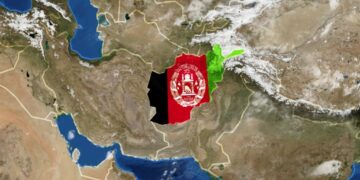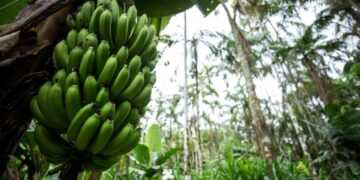REVIEW
Mazi Nwankwo Okafor Michael
Wisdom Essien
University of Passau, Germany.
Blessing Adukwu
Priscillia Ishmeal
Rachel Mujong
Rebecca Michael
This article is part of a special issue titled Bridging Power and Knowledge: Addressing Global Imbalances in Knowledge Systems for Sustainable Futures.
PLAIN-LANGUAGE SUMMARY
WATCH A SUMMARY OF THE ARTICLE
LISTEN TO THE PODCAST
Abstract
This study examines the Igbo trado-religious practices of Arochukwu, Nigeria, intending to bridge the divide between Traditional Ecological Knowledge (TEK) and Western science in addressing environmental sustainability challenges. Employing a qualitative methodology, the research utilizes semi-structured interviews, participant observation, and literature review to analyze the ecological significance of Arochukwu’s sacred market days, totemic beliefs, and herbal medicine practices. The findings reveal that Arochukwu’s trado-religious practices embody sophisticated ecological knowledge systems that parallel Western scientific understanding in several aspects. The four-day market system demonstrates an acute awareness of spatial orientation, which aligns with natural cycles crucial for sustainable resource management. Totemic beliefs inadvertently contribute to biodiversity conservation, while herbal medicine practices represent a vast repository of pharmacological knowledge. The study recommends fostering collaborative research initiatives that meaningfully integrate TEK and Western science, embracing a multicultural approach that recognizes the strengths of both knowledge systems. Additionally, it advocates for establishing equitable data-sharing mechanisms, supporting Indigenous knowledge transmission, and integrating TEK into educational curricula and environmental policies.

Keywords: Traditional Ecological Knowledge, Indigenous epistemology, Environmental governance, Knowledge systems integration, Biodiversity conservation.
Introduction
Climate change is no longer a distant threat but a more immediate overarching reality across countries of the world (Aslam et al., 2024, p.1517). More than ever, extreme weather events and natural disasters like wildfires, hurricanes, flash floods, droughts, and cyclones are becoming common occurrences (Hassan, 2024, p. 423). At present, biodiversity loss is at the highest rate ever recorded in human history. This ecological crisis, encompassing pollution and land degradation, has resulted in far-reaching consequences. Reduced agricultural harvests, community distress, and an estimated annual human mortality rate of approximately 9 million globally are dreadful effects. In addition, world temperature is projected to surpass the critical threshold of 1.5°C as early as 2027, thus portending an existential threat to humans, animals and the environment (United Nations Environment Programme, 2024, p. 2).
According to the Intergovernmental Panel on Climate Change (IPCC) (2023, p.5), regions and populations already facing significant developmental limitations exhibit high vulnerability to climatic hazards. Approximately 3.3 to 3.6 billion people reside in highly vulnerable contexts, with the most substantial adverse impacts concentrated in numerous locations and communities across Africa, Asia, Central and South America, Least Developed Countries (LDCs), Small Islands, and the Arctic, as depicted in Figure 1.

Figure 1: A dramatic photograph of a Nigerian landscape showing signs of environmental stress.
Alongside Global Environmental Issues (GEI), academic and governmental bodies, international organisations, and Non-governmental Organisations (NGOs) are making concerted efforts to mitigate climate change challenges stemming from industrialization, deforestation, and other anthropogenic activities. Conversely, these endeavors face inherent and sometimes conflicting challenges within academic scholarship. This means that despite widespread efforts, distinct academic approaches and perspectives can create significant obstacles or lead to contradictory findings, complicating the path to definitive solutions.
Western Science vs. Traditional Ecological Knowledge (TEK)
A polarization exists between Western science and Traditional Ecological Knowledge (TEK), each representing a distinct epistemological framework for understanding and addressing environmental challenges. This divergence often leads to different methodologies and priorities in tackling climate change.
Anthropocentric vs. Posthumanist Worldviews
A moral dilemma arises in choosing between anthropocentric or posthumanist worldviews as a remedial pathway for ecological degradation. This fundamental philosophical divide influences proposed solutions, leading to debates over whether human-centric approaches or broader, non-human inclusive perspectives should guide environmental policy (Lertzman 2010, pp. 109-110; Kopnina, 2019, pp. 1-2).
This divergence in understanding and approach, as well as the contrasting perspectives, is visually represented in Figure 2.

Figure 2: Western science and Traditional Ecological Knowledge approaches to environmental challenges.
TEK, also known as tacit knowledge or Local Indigenous Knowledge Systems (LINKS) (UNESCO, 2023, p. 1), is an accumulated body of knowledge, practices, and representations explaining the relationships between living beings and their physical environment. It evolves adaptively, transmitted across generations via cultural mechanisms like oral traditions, rituals, or seasonal festivities (Mazzocchi, 2006; Berkes et al., 2000, p.1252). Despite its community and cultural specificity, TEK is a “set of knowledge [that] includes an intimate and detailed knowledge of plants, animals, and natural phenomena, the development and use of appropriate technologies for hunting, fishing, trapping, agriculture, and forestry, and a holistic knowledge, or ‘world view’ which parallels the scientific discipline of ecology” (Ananda, 2021, p. 57; Miraglia, 1998). However, its parallelism with scientific knowledge remains a keenly contested subject within Western science. As Berkes et al. (2000, p. 1251) note, “‘tradition’ was a problematic word for researchers in development and anthropology” due to 19th-century stereotypes of barbarism and primitiveness.
This stereotyping of TEK was evident in broader patterns of colonial disruption and religious imposition on Indigenous knowledge in Igboland, Nigeria. British colonialism (late 19th–mid 20th century) systematically dismantled Indigenous governance systems, including the Aro Confederacy’s sophisticated ecological management practices, by forcibly enforcing cash-crop economies. This economic shift fundamentally displaced long-established, sustainable land-use traditions and undermined local resource control (Oriji, 2011). Concurrently, Christian missionary campaigns suppressed TEK by vehemently labelling Indigenous spiritual-ecological practices—such as the veneration of sacred groves (Ohia Akwu) and deity-based conservation—as “pagan” or superstitious. This aggressive evangelization effectively severed communities from ancestral knowledge intrinsically tied to their ritual landscapes, cultural identity, and sustainable resource management methods (Nweke, 2023).
Furthermore, an extant academic corpus addresses TEK and Western Science, with many contrasting scholarly perspectives gaining traction regarding environmental sustainability and knowledge-bridging. Methodologically, Mazzocchi (2006) avers that their divergent methodologies and ontological perspectives characterize the dichotomy. Western science typically employs analytical and reductionist methods, while TEK often embraces a more holistic and context-dependent approach. Western science primarily studies measurable phenomena within time and space, relying on observable data and reproducible evidence, whereas TEK focuses on observable phenomena and their metaphysical aspects to understand the natural world. Philosophically, Lertzman (2010, p. 109)—an assistant professor at the University of Calgary, who contributed to environmental sustainability before his tragic death in 2021—argues that neither TEK nor Western science represents monolithic institutions, especially since Western science itself is an Indigenous knowledge peculiar to the West: “My teachers have been indigenous professors trained within their own cultures”. He further added that colonialism’s impact on TEK practitioners and their communities has left indelible philosophical, socio-economic, and institutional barriers to bridging TEK and Western science.
From a rather religious perspective, Dasgupta and Ramanathan (2014, p. 1457) submit that: “Finding ways to develop a sustainable relationship with nature requires not only engagement of scientists and political leaders but also [the] moral leadership that religious institutions are in a position to offer” This is consequent on the fact that the expected results: sustainability and ethical use of nature, are relatively achievable, especially as four out of every five persons in the world have some religious affiliations (Kanu, 2021a, p. 74). Several researchers (including Oelschlaeger, 1994; Northcott, 2013; Khalid F 2013; Izzi Dien, 2013; Halpert, 2012), religious bodies and movements (Cornwall Alliance 2009; Lausanne Movement 2012; Global Buddhist Climate Change Collective 2015; Evangelical Environmental Network, 2006; Islamic International Climate Change Symposium, 2015 ) have also affirmed the relationship between religion and environmental sustainability. Like the syncretism of religion and TEK in Bishnoi, Rajasthan, India and the water temple system of Bali, Indonesia. On the ill effect of religion on TEK, Kanu (2021b, p. 299) fears that the influence of Christianity and Islam, western education, and other cross-cultural influences has brought about a decline in the original way and manner people (Igbos) accorded reverence to totems in African ontology.
Premised on the need for more sustainable environmental solutions that include the full value of nature in economic and political decision-making and bridging the Western-traditional ecological knowledge divide, this essay uses a qualitative research methodology to examine the Igbo trado-religious practices of Arochukwu while establishing the scientific relevance/parallels of the traditional ecological knowledge of the natives to environmental sustainability. As a single case study, data was collated through a semi-structured interview with an octogenarian, Nwankwo Micheal Okafor and participant observation. This was through a formal request and granted consent (see Appendix 1). The fact that the Igbos are scattered across the Arochukwu community made us search for methods to build trust under the condition of not living within the community. The adopted theoretical frameworks – the African Religious-based Conservation and Decolonial and Relational Land-based Theories, guide and lend relevant correlations of our findings on the Igbo trado-religious practices to ecological conservation. More so, to help inform the discussion, the essay also leveraged published academic literature, books, reliable news articles, field photos and video, with triangulation to validate the multiple sources. By organisation, section one covers the introduction (including the essay objective and problem statement, literature review and research method), and sections one, three and four cover the theoretical framework, empirical analysis and conclusion, respectively.
AFRICAN RELIGIOUS-BASED CONSERVATION AND DECOLONIAL RELATIONAL LAND-BASED THEORIES
The study employs a robust theoretical framework given the diverse phenomena under investigation. Mueller and Urbach (2017, p. 350) emphasize theory’s crucial role in research for understanding, explaining, and predicting phenomena, clarifying the ‘what, how, and why.’ While numerous popular theoretical frameworks address environmental sustainability (e.g., Resilience, Feminist, Ecological Modernization, and Deep Ecology Theories), few adequately capture power dynamics and knowledge-bridging related to environmental sustainability. Therefore, this essay adopts two theoretical frameworks for its analysis: African Religious-based Conservation Theory and Decolonial and Relational Land-based Theory. These theories, detailed below, encompass both the trado-religious practices of indigenous communities and their potential as a workable model for environmental sustainability, as illustrated in Figure 3.

African Religious-based Conservation Theory
Igbo-African theory connecting spiritual and physical realms through Chukwu (Supreme Being). Nature has inherent sacredness; “Chi” (spirit beings) influence the physical world, creating ethical frameworks for human-environment interaction.

Decolonial and Relational Land-based Theory
Challenges Eurocentric research paradigms and eliminates colonial biases against Indigenous perspectives. Promotes respectful intercultural dialogue through cultural camps to unite Indigenous land-based knowledge with Western research, fostering social justice and environmental resilience.
The African Religious-based Conservation Theory is an African indigenous theory developed by Ikechukwu Kanu Anthony (PhD). The theoretical framework is based on the nature of the Igbo-African universe. A universe that consists of the spiritual and physical realms, and created by one and the same Supreme Being called Chukwu, who controls, sustains and upholds the universe. This also explains why he is called Osebuluwa (the sustainer of the universe). It is this connection of the physical and spiritual realms of reality through Chukwu, the Igbo-African perceives the world around him in terms of religion (Kanu, 2021a). Central to this worldview is the belief that ‘Chi,’ or spirit beings, exert significant influence over the physical world. The physical realm is perceived as a stage upon which these spiritual forces manifest their power. Consequently, successful human endeavours in the Igbo community are contingent upon acknowledging and appeasing the spiritual world. This metaphysical understanding and attribution of vitality and sentience to the environment underpin the ethical framework guiding Igbo interactions with nature. Therefore, despite the submission of the African Religious-Based Conservation Theory that nature possesses inherent sacredness and deserves respect rather than exploitation, it lays the basis for the augmentation of what counts as legitimate ecological knowledge (Kanu, 2021a, pp. 43-44).
Decolonial and Conversational Land-based theory is not typically attributed to single founders but rather emerged from diverse intellectual contributions within Indigenous knowledge systems, postcolonial studies, and critical social theory. However, alluding to Datta and Starlight (2024, pp. 1-2), the decolonial and conversational land-based theory emphasizes the importance of eliminating colonial asymmetric biases towards Indigenous perspectives. This approach challenges Eurocentric research paradigms that have often marginalized Indigenous knowledge and perpetuated colonial power dynamics. The theory advocates for creating spaces where Indigenous and Western worldviews can intersect and foster intercultural and respectful dialogue through cultural camps (Teena and Datta, 2024, p. 1). At the core of the theory are the conversational components of openness, sensitivity, acknowledgement of the sacredness of culture, deep respect and sincerity to learn. These conversational ethics unite Indigenous land-based knowledge, community members, and Western researchers, facilitating collaboration and dispelling stereotypes (Datta and Starlight, 2024, pp.2-3). Additionally, Teena and Datta (2024, pp.10-12) submit: “Our decolonial conversation critically discusses why bridging Indigenous and Western knowledge systems is essential to foster mutual respect, promote social justice, and address pressing global challenges. Through traditional cultural camps, we centred Indigenous land-based knowledge as a wealth of traditional ecological knowledge and sustainable resource”. Therefore, recognizing and valuing Indigenous knowledge empowers Indigenous communities and strengthens cultural diversity, which is crucial for social cohesion and environmental resilience.
EMPIRICAL ANALYSIS
Overview of the case study area
The term Igbo refers to both the Ndigbo people and their language (Onumajuru, 2016, p.308). As one of Nigeria’s three major ethnic groups (Yoruba, Hausa, Igbo), the Igbo people are also among Africa’s largest, with a population of about sixty million (60) million. Ndigbo occupy Nigeria’s Southeast, with Igbo-land culturally spanning Northern (Enugu State), Southern (Imo State), North Eastern (Ebonyi State), Eastern (Abia State, with Arochukwu in the East), and Western Igbo (Anambra State) regions (see Figure 4). Igbo-land’s closest neighbors are the Ijaw and Ogoni in the South, the Yako, Ekoi, and Ibibio in the East, the Tiv, Idoma, and Igala in the North, and the Edo and Urhobo in the West (Chukwu, 2024; Duru, 2024; Njoga et al., 2021, p.3).

Figure 4: Map of case study area showing its position in the region, Nigeria
Source: Njoga et al. (2021, p.4)
Arochukwu, the case study area, is an ancient home to approximately 169,339 people (50.60% men, 49.40% women, per a 2022 City Population projection for 2025). It covers approximately 524 square kilometers, characterized by diverse topography, prominent settlements, and various natural resources. Arochukwu’s elevation varies, with some areas reaching around 152 meters (approximately 500 feet) above sea level, influencing its landscape, climate, agricultural practices, and settlement patterns. The region is rich in water bodies crucial to its ecosystem and livelihoods, including the Imo River, a major river in southeastern Nigeria that provides water for domestic and agricultural use, transportation, and fishing. Numerous streams and smaller rivers further enhance the area’s biodiversity and agricultural potential (Odumodu et al., 2015, p.48; Odoh et al., 2024, pp.107-108). Despite these features, Arochukwu was chosen for study due to its location in Africa’s most populous nation and its significance within Nigeria’s major ethnic groups (the Igbos), offering rich cultural and traditional ecological knowledge for academic inquiry.
Research design and validation of data collection method
This research employs a single case study methodology to examine the unique approach to environmental sustainability embedded within TEK. Data collection primarily relied on a semi-structured interview conducted with an elder from the Arochukwu community. The interview was recorded using an iPad, transcribed using a human transcription service, edited using CapCut and uploaded to Dropbox as a visual appendix. This semi-interview approach was deemed most suitable given the community’s known reticence and discernment. Chukwu (2024, p.6) observes that extracting critical information from this community can be challenging, as they tend to selectively share information deemed beneficial to their interests. Consequently, a semi-structured interview was deemed the most appropriate method to foster open dialogue and elicit in-depth insights. The interviewee, Mazi Nwankwo Michael Okafor – a respected member of the Arochukwu community with extensive knowledge of trado-religious practices and experience that corroborates existing academic literature on the region – granted an interview following his close connection to one of the researchers.
As visualized in Figure 5, the research design of this essay is predicated upon a two-pronged approach. Firstly, it elucidates several areas where Arochukwu TEK demonstrates significant relevance for ecological preservation, thereby establishing a rationale for bridging the divide between Western scientific knowledge and traditional knowledge systems. This analysis was predicated on the African religious-based theory, which provides an interpretive ground for the trado-religious practices and their parallels to Western science. Secondly, it explores potential ways for integrating Western science and TEK to foster a more inclusive and concerted effort in mitigating climate change. These highlighted ways, in bridging the divide, are guided by the decolonial and relational land-based theoretical framework earlier expounded on in section 2.

Figure 5: Schematic overview of the study design
The Arochukwu sacred market days and their ecological relevance
Before colonization and Western calendars, Igbo cosmology marked time using unique market days, central to Igbo trado-religious practices, history, and culture. These days were tied to annual religious and cultural festivals (e.g., the New Yam Festival, the Ofala Festival, and masquerade festivals), forming part of the Igbo traditional calendar. For example, the New Yam festival marks the end of one agricultural season and the rainy season (Esther and Uchechukwu, 2022, p.1). The Igbo calendar (4-day week, 7-week month, 28-day month, 13-month year, 91-week year, 364 days) significantly differs from the Western Gregorian calendar (7-day week, 30-day month, 52-week year, 365/6 days) (Kanu, 2021a, p. 41). Mazi Nwankwo Okafor elucidated that the Eke, Orie, Afo, and Nkwo market days hold significant cultural and social importance in Arochukwu and broader Igbo land (see Appendix 1), underscored by customary laws regulating activities. Specific days are traditionally allocated for farming, water and wood collection, hunting, fishing, agricultural trade, and matrimonial celebrations—a practice enabling the land use cycle and ‘co-becoming’. Deviation from these prescribed ethos constitutes a taboo with potential social and spiritual consequences within Arochukwu.
Kanu (2021b), in “Igbo- African Market Days and the Conservation of the Ecosystem”, further details the market days, corroborating interview data (See Figure 5):
1. Eke day
The beginning of the market days (Isi Mbido Ahia) and the first son of the week (Diokpara Ubosi). A sacred day where burials and marriage introductions are forbidden. It is a day for oath-taking, and associated with the sacred python (Eke).
2. Orie day
The first daughter of the week (Ada Ubosi). It marks the opening of the farming season and is a day of rest from farm work. Major celebrations like the New Yam Festival are held, but traditional marriages and divorces are forbidden.
3. Afo day
The second son of the week (Osote Diokpara). A day for merriment, masquerade displays, commerce, and socializing. Meetings of all kinds are held on this day.
4. Nkwo day
The second daughter of the week (Isote Ada Ubosi). It is considered a day for the righteous, and many celebrations begin. It is a major market day, and in some communities, women do not attend burials to ensure the market is full.
Figure 5: Overview of Arochukwu Sacred Market Days and their Cultural Significance
This highlights the market days’ multifaceted significance, blending economic, spiritual, and social dimensions to foster community cohesion and cultural continuity. Consistent with the African Religious-based theoretical framework, these days illustrate how Arochukwu natives view physical and spiritual realms as interconnected, rejecting a rigid material-metaphysical dichotomy (Kanu, 2021a, pp.43-44).
Totemism and Sacred Plants in Arochukwu and their environmental significance
Totemism, a complex system of belief and practice, establishes a profound connection between a human group and a specific animal, plant, or natural object (Onyagholo, 2025, p.58). This practice is deeply rooted in traditional African societies, characterized by reverence for sacred entities like animals, trees, and places. According to Ndubisi (2021, p.134), this totemic reverence stems from the belief that these sacred entities are inhabited by spirits, underscoring the interconnectedness between physical and spiritual realms within the African cosmology. Mazi Nwankwo Okafor, speaking on Arochukwu’s totemic beliefs, adds that its streams are considered sacred abodes of deities: “[…] we have streams, big streams, for example, where our spirit is living, that is the Long Juju of Arochukwu […] of which, a day that that spirit will come out, nobody can near that place or the rivers [sic]”. He further states that some trees, bushes, and animals in Arochukwu are totemic, exemplified by the python: “A strong animal like Agwo, in the English language we call it python […] is a very very big animal in that environment guiding the community day and night in Arochukwu […] (as seen in Figure 6). it will come and keep watch in your house. […] Like my own compound now, I have Oha leaf, I plant it […] it is a very important tree. Some plant it to prevent evil in the compound” While these beliefs might appear farfetched, they are integral to Igbo trado-religious practices, enforced by strict adherence due to perceived dire consequences for desecration. This totemic belief also substantiates the theorized intersection between the material and immaterial worlds within the African religious-based conversational theoretical framework. Below are some other totemic beliefs of Arochukwu and the Igbo land (see Table 1):

Figure 6: Python in natural Nigerian forest setting.
Table 1: Totemic objects and beliefs in Arochukwu and Igbo land
| S/N | Totemic entities | Totemic beliefs |
|---|---|---|
| 1 | Python (Agwo or Eke) | Referred to as ‘Our Mother’ (Nne anyi). It is taboo to kill it, as it is an abode for ancestral spirits. Killing one requires performing burial rites. |
| 2 | Owl (Ikwikwi ) | A symbol of vigilance, believed to be a messenger from the ancestors. Killing it means cutting off communication with the gods. |
| 3 | Ram (Ebuna) | A symbol of greatness and the choice animal for sacrifices to the deity Amadioha. Used in important ceremonies and burial rites for strong men. |
| 4 | Tiger (Agụ) | A sacred animal in Umulelu, Abia state. It is not eaten or killed, with oral history suggesting community members could transform into tigers. |
| 5 | Tortoise (Mbekwu) | A mystical symbol of wisdom and discernment. Its shell is used by diviners in religious rituals. |
| 6 | Iroko, Ngwu, Ofo, Ogirisi, Oha | Sacred plant species to which sacrifices are offered. They are sometimes used as offerings to the gods of the land. |
Source: Kanu (2021a, pp. 6-8) and Ndubisi (2021, pp. 137-138)
Arochukwu trado-herbal medicine
Herbal medicine also known as indigenous or traditional medicine is a type of medicine or therapy found among aboriginal inhabitants of a particular community. It makes use of spirituality, herbs, animals and mineral components either combined or used singly to bring about healing and protection to both humans and animals (Obika and Eke, 2019, p.1678). Accordingly, because survival within the natural environment necessitates a degree of environmental manipulation and adaptation, traditional healthcare systems played a pivotal role in ensuring human survival in pre-colonial African societies (Tunde, 2021, pp.109-110). At present, notwithstanding the several critiques of traditional medicine, about 80% of the African population still relies on traditional medicine for their basic health needs with about 45 herbal medicines adopted on national essential medicines lists (World Health Organization, 2022, p.1), as illustrated in Figure 7.

Figure 7: Traditional Igbo herbal medicine, showing a collection of herbs and medicinal plants prepared for use, illustrating a key aspect of Arochukwu’s traditional healthcare practices.
DISCUSSION
Arochukwu trado-religious practices: Ecological significance and scientific parallels
The close similarity between the market days, totemic beliefs and herbal medicine as regards tradition and religion by the Igbos in Arochukwu evidentially captures TEK in its unique and natural form. As earlier established, these traditional knowledge systems are strongly contested within Western academia and by mainstream medical practitioners, especially for their lack of objectivity, measurability and adherence to scientific methods. Despite the associated lack of empiricism with TEK, these Indigenous knowledge systems consist of several parallels with Western knowledge and ecological significance in understanding and preserving our natural world. The United Nations Development Programmes (UNDP) (2020, p. 3), on social and environmental standards, affirms that indigenous peoples’ holistic approach to well-being often emphasizes harmony with nature, self-governance, priority of community interests over individual ones, security of land, resource rights, cultural identity and dignity
Specifically, the cyclical nature of the Igbo market days in Arochukwu embodies a sophisticated system of resource management that aligns with contemporary principles of sustainability, including ethical sharing, shifting cultivation, and permaculture. The traditional allocation of specific days for activities such as farming, water and wood fetching and hunting demonstrates a deep understanding of ecological respect and the importance of allowing for periods of rest and regeneration. Hence, ensuring the sustainable utilization of natural resources and fostering a sense of community and shared responsibility. All these, amid the evolution and erosion of several traditional practices by modern pressures, buttress the pertinence of the trado-religious practices of Arochukwu. Additionally, at the core of the observation of these days are the taboos – an institution with spiritual and ecological implications – that compel obedience. By adhering to the market days, the Igbos have demonstrated a remarkable capacity for living in harmony with their environment for generations. Therefore, this traditional knowledge system offers valuable insights to societies and key sector actors grappling with environmental challenges by emphasizing the importance of respecting ecological limits, fostering sustainable resource use, and cultivating a harmonious relationship with the natural world.
Furthermore, totemic beliefs within Arochukwu society demonstrate a remarkable congruence with modern ecological principles. By identifying certain animals and plants with sacred significance, these beliefs inadvertently contribute to biodiversity conservation. The reverence accorded to totemic species, such as the Eke/Agwo (python) – exemplified by the avoidance of harm (see Appendix 2) and the performance of respectful rituals in cases of accidental harm – fosters an environment conducive to their survival and well-being. This reverence, indicating co-becoming – highlights the inherent value embedded within traditional ecological knowledge systems. The protection and reverence of totemic species not only ensures their continued existence but also contributes to the overall health and stability of the ecosystem.
In conclusion, as what is deemed rudimentary or traditional is not inherently inefficient or unimpactful, traditional medicine parallels Western medicine in source, result and side-effect. Herbal medicine, just like Western medicine, involves, inter alia, the use of plants and other resources from the environment, which have been verified over the years by generations to treat sicknesses. While the side effects of taking herbal medicine remain a profound subject of deliberation, Western medicine is also condemned for its side effects. A qualitative study conducted among 28 diabetic patients in four government clinics under the jurisdiction of the state of Negeri Sembilan, Malaysia, found that most of the patients perceived the negative side effects of Western medicine, which led them to consider incorporating herbal medicine in treating diabetes (Ithnain et al., 2024, p.125). Similarly, because practitioners of traditional medicine believe in multiple ontological sides of sicknesses – natural and spiritual, with recorded results, this, to some extent, parallels the results of Western medicine (Tunde, 2021, p. 167).
These diverse ecological and philosophical parallels between Arochukwu TEK practices and Western ecological models are further illustrated in the comparative analysis shown in Table 2.
Table 2: TEK and Western Ecological Models Parallels
| Arochukwu TEK Practices | Western Ecological Model | Key Similarities |
|---|---|---|
| Seasonal Rotational Farming (Mgbariwe ala) | Agroecology | They both emphasize crop diversity, soil fertility cycles, and reduced chemical dependency. |
| Market Days and Seasonal Calendars for Planting/Harvest | Phenology | Both track biological cycles for optimal resource use. |
| Community-Based Wildlife Hunting Quotas | Sustainable Yield Model (MSY) | Both impose limits to prevent overharvesting. |
| Spiritual Sanctions for Overexploitation | Tragedy of the Commons Theory | Both address resource overuse through governance. |
| Sacred Groves (Ohia Akwu) & Species Taboos | Island Biogeography Theory | They both recognize habitat patches as critical for biodiversity conservation. |
| Herbal Medicine | Pharmacology | They are both geared to improve health |
Source: Informed from interview and Berkes (2012).
RECOMMENDATIONS ON BRIDGING TEK AND WESTERN SCIENCE
Humanity’s broken relationship with the natural world underlies our current environmental reality (United Nations Environment Programme, 2024, p. 2). Bridging the perceived gap between Traditional Ecological Knowledge (TEK) and Western science is crucial for addressing escalating environmental challenges from anthropogenic activities. While Western science emphasizes empirical data and quantitative analysis, TEK, embedded in indigenous cultures, offers a profound understanding of local ecosystems, developed over generations through observation and lived experiences. This understanding entails intricate knowledge of plant and animal behavior, seasonal patterns, and the interconnectedness of all living beings within an ecosystem. Recognizing the limitations of a purely Western scientific approach and the invaluable insights from TEK enables more holistic and effective solutions for environmental conservation and sustainable development.
Appealing to the Decolonial Relational Land-based Theory’s components—openness, sensitivity, acknowledgement of cultural sacredness, deep respect, and sincerity to learn—the following recommendations are submitted:
Rectifying colonial biases
Recognize and address historical power asymmetries marginalizing Indigenous knowledge, challenging Western epistemic violence through institutional and policy shifts.
Equitable knowledge exchange through cultural camps
Institute fair protocols for reciprocal data sharing, ensuring proper acknowledgement and benefit distribution. Encourage cultural camps (e.g., Two-Eyed Seeing) to integrate knowledge systems.
Mainstreaming TEK in education
Systematically incorporate TEK into all education levels to raise awareness and cultivate deeper understanding of diverse knowledge systems for sustainable living.
Policy Integration
Advocate for explicit TEK integration into environmental policies and decision-making, creating formal mechanisms for TEK holders’ active participation.
Culturally sensitive research paradigms
Develop research methodologies consonant with Indigenous cultural protocols, values, and worldviews, including culturally appropriate consent and finding presentation.
Harmonious research initiatives
Establish research collaborations that authentically merge TEK with Western science, ensuring Indigenous wisdom is respected and integrated into research and policy.
Preservation of Indigenous knowledge
Allocate resources to initiatives facilitating TEK transmission and revitalization, including language preservation, documentation, and intergenerational knowledge transfer.
CONCLUSION
This study endeavours to bridge the conceptual and practical divides between Traditional Ecological Knowledge (TEK) and Western science, fostering a more integrated approach to environmental challenges. By meticulously analyzing extant academic literature, relevant reports, and theorizing with the African Religious-based Conservation and the Decolonial Relational Land-based theories, this essay argues that the trado-religious practices of Arochukwu is parallel to Western science in several ways and thus, should be recognized and adopted in mainstream environmental sustainability policies and practices, especially as what may be termed traditional or indigenous may not entirely be ineffective. The sacred and intricate aspects of Eke, Orie, Afo and Nkwo market days, coupled with the unfeigned reverence of certain animals, plants and places, are identified through the prism of the African Religious-based Conversation theory as unique ways in which the Igbos respect and co-exist with their environment and ensure sustainability. This resonates with the concept of care-as-country that implies an effectiveness in caring for the environment when seen “as” a part of us. The study also submitted some parallels between TEK and Western science in terms of source, result and side-effects. Furthermore, given the establishment of ecological significance and parallels, the study transcended towards establishing ways TEK and Western science, two methodologically distinct systems of knowledge, can be bridged. Therefore, it submits that bridging the gap between TEK and Western science requires a commitment to respectful dialogue, equitable partnerships, and a genuine desire to learn from diverse knowledge systems. By fostering collaborative research, supporting Indigenous knowledge keepers, and integrating TEK into education and policy, we can create a more just and sustainable future where both Indigenous and Western knowledge systems are valued and respected. This collaborative endeavour will not only enhance our understanding of the natural world but also contribute to the sustainable well-being of both humans and our environment.
ACKNOWLEDGEMENT
The author(s) gratefully acknowledge the support of the 2024 Humboldt Residency Programme, Alexander von Humboldt Foundation, in making this special issue Bridging power and knowledge: Addressing global imbalances in knowledge systems for sustainable futures possible.
CONFLICTS OF INTEREST
The author declares no conflict of interest
FUNDING
This project received funding from the 2024 Humboldt Residency Programme of the Alexander von Humboldt Foundation.
REFERENCES
Ananda, T. (2021). Indigenous Knowledge System Among Meemure Inhabitants; Kandy District, Sri Lanka. 02, 56–70.
Aslam, M., Hussain, S., & Salah-Ud-Din, S. (2024). Climate Change: A Threat To National Security of Pakistan. 3, 1517.
Berkes, F. (2012). Sacred Ecology (3rd ed.). Routledge. https://doi.org/10.4324/9780203123843
Bhattacharyya, P. (2024). Ecology of the “Other”: A Posthumanist Study of Easterine Kire’s When the River Sleeps (2014). Humanities, 13(1), 19. https://doi.org/10.3390/h13010019
Bikorimana, G., Maniraho, L., & Umuziranenge, G. (2024). Exploring the Nexus between Natural Resource Management and Poverty Reduction in Rwanda Exploring the Nexus between Natural Resource Management and Poverty Reduction in Rwanda. 4, 171–188. https://doi.org/10.51062/ascwp.4.0_171
Chukwu, V. (2024). Historical Overview of Music in Igbo-Land. 1, 1–21.
City Population. (n.d.). Arochukwu (Local Government Area, Nigeria) – Population Statistics, Charts, Map and Location. Retrieved July 14, 2025, from https://citypopulation.de/en/nigeria/admin/abia/NGA001003__arochukwu/
Cyprian Obiora, A. (2015). African Indigenous Knowledge System and Environmental Sustainability. International Journal of Environmental Protection and Policy, 3(4), 88. https://doi.org/10.11648/j.ijepp.20150304.12
Dasgupta, P., & Ramanathan, V. (2014). Pursuit of the Common Good. Science, 345(6203), 1457–1458. https://doi.org/10.1126/science.1259406
Datta, R., & Starlight, T. (2024). Building a Meaningful Bridge Between Indigenous and Western Worldviews: Through Decolonial Conversation. International Journal of Qualitative Methods, 23, 16094069241235564. https://doi.org/10.1177/16094069241235564
World Health Organization, Regional Office for Africa. (2022). African Traditional Medicine Day 2022. Retrieved January 18, 2025, from https://www.afro.who.int/regional-director/speeches-messages/african-traditional-medicine-day-2022
Duru, C. (2024). Effectiveness of incantations as a mode of communication in the traditional Igbo society. In Recent Research Advances in Arts and Social Studies Vol. 8 (pp. 15–29). doi:10.9734/bpi/rraass/v8/7625E
Onuoha, E. C., & Uchechukwu, C. (2022). The metaphorical expression of time in Igbo. Cogent Arts & Humanities, 9(1), 2131067. doi:10.1080/23311983.2022.2131067
Hassan, M. (2024). Changes in the knowledge of journalism students participating in the climate journalism course on the climate crisis. Erciyes İletişim Dergisi, 11, 423–440. doi:10.17680/erciyesiletisim.1445407
Intergovernmental Panel on Climate Change. (2023). Climate Change 2023: Synthesis Report. Contribution of Working Groups I, II and III to the Sixth Assessment Report of the Intergovernmental Panel on Climate Change (H. Lee & J. Romero, Eds.). IPCC. doi:10.59327/ipcc/ar6-9789291691647
Ithnain, N., Panting, A. J., Kassim, R., Amirudin, N., & Krishnan, M. (2024). Perception of conventional medicine and herbal medicine usage amongst diabetic patients: A qualitative study in Negeri Sembilan, Malaysia. Global Journal of Health Science, 12, 122–122. doi:10.5539/gjhs.v12n10p122
Kanu, I. A. (Ed.). (2021a). African Indigenous Ecological Knowledge Systems: Philosophy, Religion and the Environment. APAS, a Publication of Association for the Promotion of African Studies.
Kanu, I. A. (2021b). Igbo-African market days and the conservation of the eco-system. African indigenous ecological knowledge systems: Religion, philosophy and the environment.
Kopnina, H. (2019). Anthropocentrism and post‐humanism. In Wiley Interdisciplinary Reviews: Climate Change. doi:10.1002/9781118924396.wbiea2387
Kumar, P., Sharma, A. K., & Fatma, A. (2024). The ethical dimensions of global environmental issues: An analysis. [Journal Title if known], 10, 711–723.
Lertzman, D. (2010). Best of two worlds: Traditional ecological knowledge and Western science in ecosystem-based management. BC Journal of Ecosystems and Management, 10.
Mazzocchi, F. (2006). Western science and traditional knowledge: Despite their variations, different forms of knowledge can learn from each other. EMBO Reports, 7(5), 463–466. https://doi.org/10.1038/sj.embor.7400693
Miraglia, R. A. (1998). Traditional Ecological Knowledge Handbook: A training manual and reference guide for designing, conducting, and participating in research projects using traditional ecological knowledge. Alaska Department of Fish and Game, Division of Subsistence.
Mueller, B., & Urbach, N. (2017). Understanding the why, what, and how of theories in IS research. Communications of the Association for Information Systems, 41, 349–388. https://doi.org/10.17705/1CAIS.04117
Njoga, U. J., Njoga, E. O., Nwobi, O. C., Abonyi, F. O., Edeh, H. O., Ajibo, F. E., Azor, N., & Eze, O. J. (2021). Slaughter conditions and slaughtering of pregnant cows in Southeast Nigeria: Implications to meat quality, food safety and security. Foods, 10(6), 1–19. https://doi.org/10.3390/foods10061298
Nkama, C. L., Okoro, K. N., & Egbule, E. (2022). Eco-preservation through the lens of Igbo beliefs and practices: A re-imagination. Religions, 13(11), 1066. https://doi.org/10.3390/rel13111066
Nweke, K. C. (2023). Christianity and the indigenous spiritualities of the Igbo people: From multi-religiousness to synculturation. Religious: Jurnal Studi Agama-Agama dan Lintas Budaya, 7(2), 129–142. https://doi.org/10.15575/rjsalb.v7i2.29658
Oando, O. (2024). Incorporating traditional ecological knowledge into science education, a case study of Mbita Sub-County. Regional Journal of Information and Knowledge Management, 9, 95–116. https://doi.org/10.70759/3xecwv02
Obika, A., & Eke, O. (2019). Essay on Igbo folk medicine as an indispensable aspect of health care delivery in the 21ST century. International Journal of English Literature and Social Sciences, 4, 1677–1686. https://doi.org/10.22161/ijels.46.9
Odoh, B., Nwokeabia, C., & Ibezue, V. (2024). Geophysical assessment of groundwater resources in Arochukwu: Integrating Ves data with land use dynamics. Journal of Environmental Management, 15, 105–122.
Suchet-Pearson, S., Wright, S., Lloyd, K., Burarrwanga, L., & Country, B. (2013). Caring as country: Towards an ontology of co-becoming in natural resource management. Asia Pacific Viewpoint, 54(2), 185–197.
Odumodu, C. F. R., Ugwuonah, E. N., & Ephraim, B. E. (2015). Characterization of diagenetic processes of the late Maastrichtian – Danian limestones in Ohafia, Ozu Abam and Arochukwu areas of Southeastern Nigeria. Journal of Natural Sciences Research, 5(6), 40–46. https://www.iiste.org/Journals/index.php/JNSR/article/download/21078/21339
Onumajuru, V. C. (2016). A semantic and pragmatic analyses of Igbo names. African Research Review, 10(2), 307–324. https://doi.org/10.4314/afrrev.v10i2.21
Onyagholo, A. (2025). Totemism, taboo and animal species conservation in Kolo Creek Clan. African Journal of Environment and Natural Science Research, 8, 56–65. https://doi.org/10.52589/AJENSR-HKYHQN8R
Oriji, J. N. (2011). Political organization in Nigeria since the late Stone Age. Palgrave Macmillan. https://doi.org/10.1057/9780230116689
Teena, S., & Datta, R. (2024). Braiding Indigenous and Western Knowledge through Traditional Cultural Camps: Decolonial Learning Conversation between Indigenous Land-Based and Settler-of-Color Scholars. AlterNative: An International Journal of Indigenous Peoples, 20(1), 22–32. https://doi.org/10.1177/11771801231221376
Tuhiwai Smith, L. (1999). Decolonizing methodologies: Research and Indigenous peoples. Zed Books.
United Nations Development Programme. (2020). UNDP Social and Environmental Standards. Standard 6: Indigenous Peoples. http://ses-toolkit.info.undp.org/sites/g/files/zskgke446/files/SES%20Document%20Library/Uploaded%20October%202016/UNDP%20SES%20Indigenous%20Peoples%20GN_Final_December%202020.pdf
UNESCO. (2023). UNESCO Digital Library. Natural Sciences Sector- Local Indigenous Knowledge Systems (LINKS). https://unesdoc.unesco.org/ark:/48223/pf0000385181
UNEP. (2022). Facts about the nature crisis. UNEP – UN Environment Programme. http://www.unep.org/facts-about-nature-crisis
AUTHOR(S) VIDEO SUMMARY
ABOUT THE AUTHOR(S)

Wisdom Essien
📧essien01@ads.uni-passau.de
I am a DAAD scholar pursuing a Master’s degree in Governance and Public Policy at the University of Passau, Germany. This endeavor reflects my long-standing commitment to promoting good governance and development in Nigeria and across Africa. In 2024, I co-won the Sen Amartya/Global Financial Integrity Essay Competition (held at Yale University) for work addressing global illicit financial flows. Before graduate studies, I served as the pioneer president of the student wing of the Anti-Corruption and Transparency Unit (ACTU) at the University of Nigeria, Nsukka. My research interests include digital and emerging democracies, African political economy, development studies, and other interdisciplinary areas.
Mazi Nwankwo Okafor Michael
Blessing Adukwu
Priscillia Ishmeal
Rachel Mujong
Rebecca Michael
Received: January 21, 2025
Accepted: July 04, 2025
Published: October 31, 2025
Citation:
Okafor, M. N., Essien, W., Adukwu, B., Ishmeal, P., Mujong, R., & Michael, R. (2025). From Spiritism to Empiricism: Bridging the Western-Traditional Knowledge Divide With the Igbo Trado-Religious Practices of Arochukwu. SustainE, 3(1), 31–54. In A. Akinsemolu, A. Eimer, & S. Iqbal (Eds.), Bridging power and knowledge: Addressing global imbalances in knowledge systems for sustainable futures [Special issue]. https://doi.org/10.55366/suse.v3i1.3
Disclaimer: The opinions and statements expressed in this article are the author(s) sole responsibility and do not necessarily reflect the viewpoints of their affiliated organizations, the publisher, the hosted journal, the editors, or the reviewers. Furthermore, any product evaluated in this article or claims made by its manufacturer are not guaranteed or endorsed by the publisher.

Distributed under Creative Commons CC-BY 4.0











